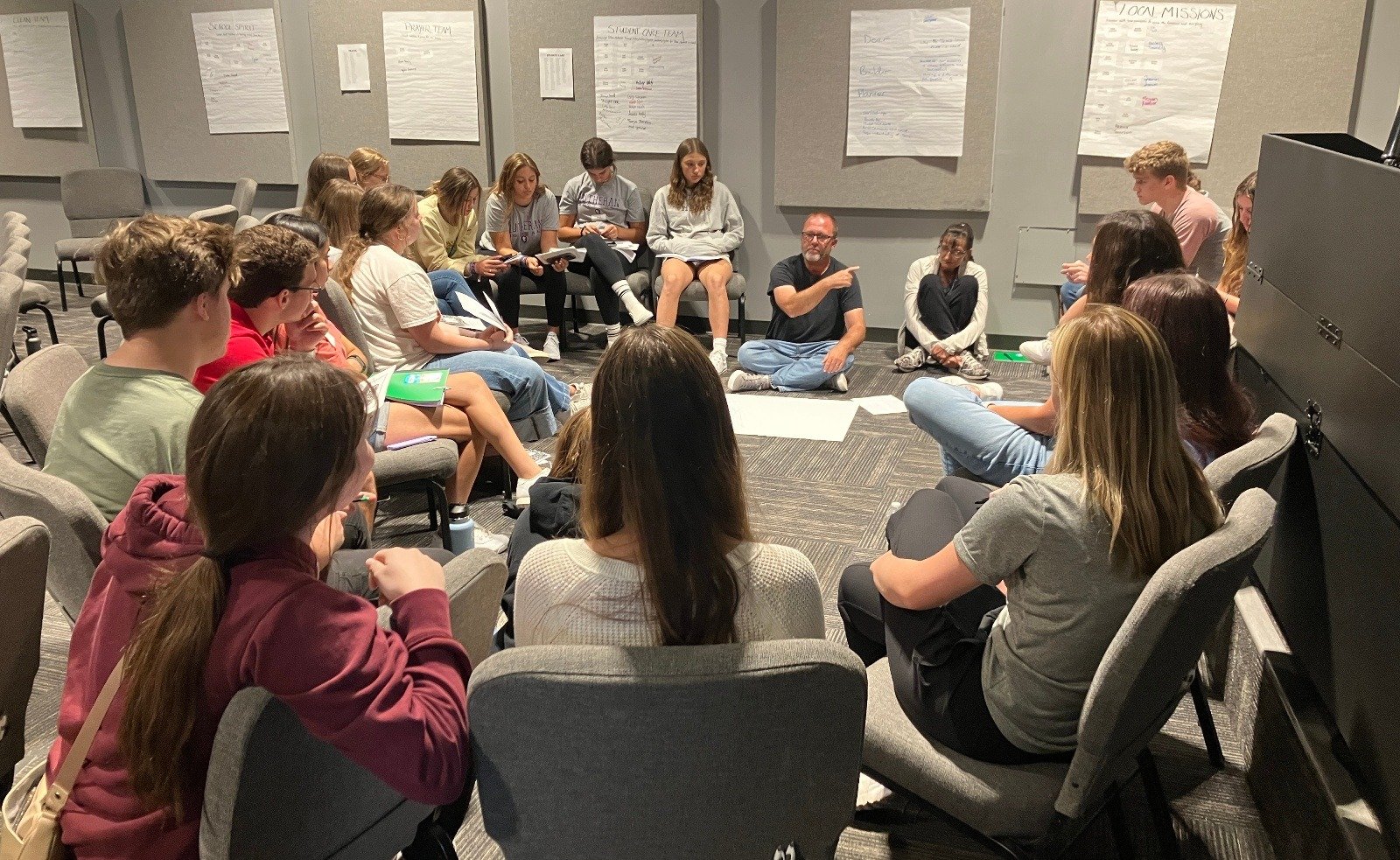Access Class: What it is, isn't, and everything in between
At LuHi, we believe each student can find academic success including students with support plans. Learn more about how Access class functions.
BY Hannah Buchholz
More than most, the Access teachers at LuHi get asked a lot of questions. What's thirteen times nine? How do you do this Spanish assignment? What's personification again? Can I go ask Mrs. Rogness a question? Have you seen my planner?A common question prospective and new families ask is, What exactly is Access, anyway? Who is it for? How is it different from resource programs at other schools?
What is Access?
At first glance, Access, short for Academic Success, looks a whole lot like a study hall. And in some ways, it is a study hall. Students have time to work on whatever they need to work in in Access class.
There are a few subtle differences – for instance, the class size is smaller than a typical study hall. And while study halls have the purpose of checking homework off a to-do list, Access has the added purpose of boosting students' soft skills such as organization and advocation.
The biggest difference is the demographic of students. Access is only for students with an IEP or a diagnosed learning difference. Some examples of common learning differences include Dyslexia and ADHD. If students apply to or start at LuHi without an IEP but suspect they would benefit from one, there are two options:
- Students can request an evaluation from Douglas County School District
- Students can choose a private evaluator to perform testing and write an IEP.
Day to day, Access can function differently for students. Some students may struggle with a specific subject, such as math or literature. If a student struggles with math, he will likely use class time to work on math homework. This way, if the student finds out he is not comfortable with a math concept, he can get help while he's at school. Access teachers encourage students to talk to their classroom teachers as a first line of defense. For help in math or writing, lunchtime tutoring is also available to all students.
As Access has adapted to better meet students' needs over the years, every student works on organization and soft skill development. This includes: building habits of using planners to track homework assignments learning good organizing techniques for folders, binders, and lockers growing in the confidence of asking questions in a classroom setting practicing self-advocacy with adults finding the best method for ensuring all homework is turned in
Access teacher Kalia Mancell shares, "For soft skills, I focus on confidence, learning style, executive functioning, communication, stress management, self-advocacy, time management, and organization. However, individual skills are added when a student needs them."
What is a Support Plan and how is it implemented?
After a student is accepted, our Support Plan Coordinator creates an Individualized Support Plan for each Access student. This plan details the different accommodations that a student can receive at LuHi in order to help them be most successful.
Although we cannot provide every accommodation recommended by an evaluation or on the IEP, the LuHi Individualized Support Plan will list the recommended accommodations for teachers to follow. Most of these accommodations have to do with assignments, tests or quizzes, and general study skills. Some examples include:
- extra time up to 1.5 times on assessments
- copies of class notes
- use of audiobooks
- assistive technology (such as typing instead of writing)
For a full list of accommodations, click here.
Teachers can always view their students' support plans to understand how they learn most effectively. But it is also important that students advocate for themselves and ask for these things when they feel like they need to take advantage of them. Self-advocacy is taught in Access and is an important skill we'll discuss in more detail later in this post.
Part of the Access teacher's job is to make sure students understand their Support Plans and feel comfortable communicating with their teachers about what they need.
-1.png?width=800&height=640&name=instagram-new%20size-landscape%20(1)-1.png)
What's the difference between a modification and an accommodation?
A modification happens when the curriculum is changed to meet a student's needs or when expectations are changed for what a student has to learn.
An accommodation happens when there is a change in how information is presented to the student.
For example, let's say a history class is memorizing all the presidents of the United States. A modification might ask a student to only memorize the most recent 20 presidents or to memorize a different set of information altogether. An accommodation would still ask the student to memorize all of the presidents but with the option to verbally recite or type the information instead of writing it down on paper.
Accommodation options differ based on an individual student's needs. At Lutheran High School, we provide accommodations but not modifications.
We don't offer modifications simply because we don't offer Special Education programming and are not equipped to provide them. Modifications would require separate classes (Modified Algebra, Modified Literature, etc.) or serious changes in the curriculum.
Accommodations work for us because we like to give a student the opportunity to learn everything his classmates are learning while also recognizing that he may learn best in a different way than the typical student.
What's the difference between Special Education and Access?
Special Education is almost always a program rather than a class, and an Access class or lab is often part of such a program. SpEd instruction is differentiated to fit the student. Access focuses on skill building to help students become successful in their classes and future. Special Education programs offer modified or remedial classes, and they often have several different professionals on staff, such as a speech-language pathologist, school psychologist, and sometimes even an IEP and Assessment Specialist.
Special Education programs are common at public schools. Private and Christian schools are more likely to have an Access Program like the one at LuHi.
What is self-advocacy, and why is it important?
Self-advocacy is an extremely important part of high school. It means speaking up when you don't understand something, asking a teacher for additional help, or explaining why you believe you are struggling with something. Parent involvement can be extremely helpful when it comes to high school and problem-solving or ensuring one's success. But, high school is an excellent time for students to get their feet wet in speaking up for themselves and learning how to navigate these issues and conversations.
Every high school student is learning how to advocate for themselves, but self-advocacy can be particularly difficult for Access students. Some of these students may lack self-confidence and not feel comfortable asking for extra help beyond what they see their peers getting from teachers.
Part of being in Access is learning what self-advocacy is and how to go about asking questions and seeking help. A big part of the program is helping students figure out what they are struggling with and then coaching them through seeking help from a teacher.
From the Staff
"I love walking alongside students and seeing their confidence grow in themselves and their abilities as students. Witnessing when they start to believe in themselves the way that I believe in them is such a blessing that I am thankful for each day!" – Heather Homami, Support Plan Coordinator
"My favorite part is seeing my students' success. That looks different for each student. For example, seeing students so proud of the work they put in to understand a concept run back to show me a positive test score. For other students, it could be having the confidence to talk to teachers or start a conversation with another student. Another example is when students are finally comfortable enough to ask me for help. I love seeing growth in every aspect of my student's lives!" - Kalia Mancell, Access Teacher
General Study Tips for Access Students
1) Setting goals is a very effective way to be successful in school and in life. But what's even more important is remembering to also come up with action steps that will help you achieve your goals.
For example, you may set a goal to get a B in Algebra II. Some appropriate action steps would be to do your homework, always complete the study guides, ask one question about the homework per day, and to visit your teacher for extra help every Tuesday and Thursday during teacher office hours.
2) When it comes to memorization, everyone's brain works a little differently. Try several different methods to figure out what works best for you. Writing terms out, speaking them aloud, using colored flashcards (maybe your brain will remember a specific color well), or creating hand movements or signs for each item are all good things to try.
If you want extra practice in math, go back to one of your previous assignments in the textbook and complete some of the problems you weren't asked to complete for homework. Most of the time, the answers for the odd-numbered problems are in the back of the book, so you can check your work.
3) Using a planner is positively vital when it comes to success in school. However, your planner doesn't have to look like everyone else's. Figure out what works best for you. You can keep a traditional notebook planner or use a planner app in your phone, a system of sticky notes, a series of texts sent to your parent, or anything else that works for you.
If you have any questions about our Access Program, please feel free to contact Kalia Mancell (kalia.mancell@lhsparker.org).
This post was originally scheduled in 2017 and has been updated for accuracy in 2025.




